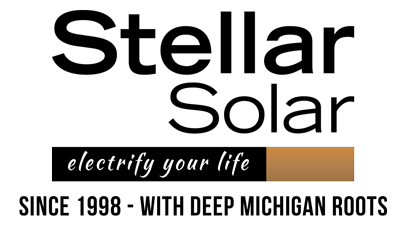If you’re a Michigan homeowner wondering whether solar panels are worth it — you’re definitely not alone. With energy bills on the rise and climate concerns front and center, more people across the state are looking up at their rooftops and thinking, “Could I be generating my own power?”
Spoiler alert: The answer might just be yes.
Despite Michigan’s reputation for cloudy winters, going solar here actually makes a lot of sense. Let’s break it down — from costs and savings to incentives, winter performance, and everything in between.
Can Solar Really Work in Michigan?
Yes — and better than you might think.
Sure, Michigan isn’t exactly Arizona when it comes to sunlight, but modern solar technology is built to handle less-than-perfect weather. On average, Michigan gets about 4 peak sun hours per day. That’s more than enough for solar panels to do their job — and save you money.
Plus, the price of solar has dropped a lot over the last decade. Combine that with strong incentives including the 30% tax credit, and you’ve got a recipe for serious long-term savings.
What Does It Cost to Go Solar in Michigan?
The average cost for a residential solar system in Michigan is between $12,000 and $25,000 before any incentives. That might sound like a lot, but thanks to the Federal Solar Tax Credit, you can get 30% of that back on your taxes.
So, let’s say your system costs $18,000 — you’d get a $5,400 credit, bringing your net cost down to $12,600.
And that’s not even counting what you’ll save on your electric bill over the years.
How Much Can You Save?
Most Michigan homeowners can cut their electricity bills by 50% or more after switching to solar. Some even eliminate their bill entirely — especially if they pair solar with energy-efficient upgrades or battery storage.
And while you’ll still be connected to the grid (unless you go fully off-grid), your solar panels will produce enough electricity to offset a big chunk of what you use.
Better yet, once you hit the system’s payback period — usually around 7 to 10 years — everything you generate after that is essentially free electricity.
Incentives That Make Solar More Affordable
Here’s a quick rundown of what’s available in Michigan:
- Federal Solar Tax Credit (ITC) – Get 30% of your total system cost back as a tax credit.
- Inflow/Outflow Billing – Michigan’s version of net metering lets you earn credit for extra electricity your panels send back to the grid.
- Property Tax Exemption – Your home value may increase with solar, but your property taxes won’t.
- PACE Financing – Available in some areas, this lets you pay for solar through your property tax bill (great if you’re short on upfront cash).
- Utility Rebates – Some utility companies offer rebates or other solar-friendly programs. Check with DTE, Consumers Energy, or your local provider.
But What About Michigan Winters?
It’s true — Michigan winters can be long, gray, and snowy. But solar still works.
Here’s the deal:
- Solar panels generate electricity even on cloudy days (just less).
- Snow can temporarily block sunlight, but it usually slides off tilted panels pretty quickly.
- Summer production tends to be so high that it balances out the lower output in winter.
So don’t let a little snow stop you — solar still pays off over the course of the year.
Should You Get a Battery Too?
Adding battery storage (like a Franklin aPower2, Enphase 5P or Tesla Powerwall 3) lets you store extra energy for later — especially useful during outages or at night. It’s a nice bonus, but not essential for most homeowners.
Is Your Home a Good Fit for Solar?
Before you call an installer, ask yourself:
- Does your roof get plenty of sun (little to no shading)?
- Is your roof in good shape (10+ years of life left)?
- Do you use a decent amount of electricity each month?
- Are you planning to stay in your home for at least 5–10 years?
If you answered “yes” to most of those, your home is probably solar-ready.
Finding a Reliable Installer in Michigan
There are plenty of solid solar companies in Michigan. Some popular names include:
- Stellar Solar Michigan
- Strawberry Solar
- CBS Solar
Be sure to:
- Get multiple quotes
- Ask about warranties
- Review their track record
- Make sure they handle permits and paperwork for incentives
A good installer will also give you a personalized estimate that includes savings projections, payback period, and system specs.
What’s the Long-Term ROI Look Like?
Solar panels last 25–30 years, and many come with 25+ year warranties. Once your system pays for itself (usually by year 8–10), it’s just pure savings.
Over the life of the system, you could save $25,000 to $300,000 or more, depending on your usage and energy rates.
Plus, your home could see a boost in resale value. Buyers love the idea of lower utility bills, and many are willing to pay more for a home with solar already installed.
Solar in Michigan = A Cleaner, Greener Future
Installing solar isn’t just a smart money move — it’s also a meaningful way to reduce your carbon footprint.
By generating your own clean energy, you’re helping cut down on pollution, support renewable energy growth, and contribute to a more sustainable Michigan.
Pretty awesome, right?
Ready to Go Solar? Here’s Your Next Step
If you’re ready to explore your solar options, start by getting a few quotes from local installers. Most companies offer free consultations where they’ll look at your roof, your energy usage, and run the numbers to show you exactly how much you can save.
The sooner you start, the sooner you start saving — and with federal incentives still at 30%, now’s a perfect time to make the switch.
